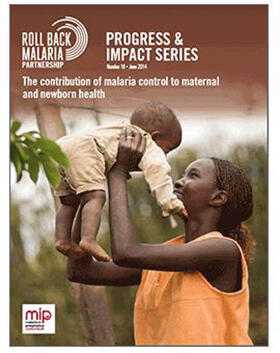
A new report, co-authored by LSTM’s Jenny Hill and Annemieke van Eijk, was launched today alongside the annual High-Level Segment of the United Nations Economic and Social Council (ECOSOC) in New York. The report, The Contribution of Malaria Control to Maternal and Newborn Health, highlights the impact of malaria interventions on maternal, newborn and child health and is the latest in the Roll Back Malaria (RBM) Partnership’s Progress & Impact Series to help assess progress towards targets set out in the Global Malaria Action Plan (GMAP) and the United Nations Millennium Development Goals (MDGs).
Malaria in pregnancy contributes largely to maternal and neonatal mortality. In Africa, 10,000 women and between 75,000 and 200,000 children under the age of one are estimated to die annually as a consequence of malaria infection during pregnancy. Malaria is a major cause of anaemia in pregnant women, and can lead to maternal death in severely anaemic women at delivery due to haemorrhage. It causes stillbirth, preterm birth, and 11% of neonatal deaths are due to low birth weight resulting from malaria infections in pregnancy.
The report reviews progress with coverage of two important preventive strategies in pregnancy, intermittent preventive malaria treatment during pregnancy (IPTp) and insecticide-treated mosquito nets (ITNs), which in 2012 reduced the risk of neonatal death by 18% and low birth weight by 21%. The report states that the despite the fact that many countries in sub-Saharan Africa have relatively high antenatal care coverage, coverage of IPTp and ITN use remains extremely low suggesting substantial missed opportunities at antenatal clinics.
The use of these proven preventive measures contributes positively to the achievement of the MDGs – especially those related to maternal health improvement and reduction of under-five mortality – while also allowing progress against broader targets by contributing to a healthier and more productive society.
Jenny Hill, Manager of the Malaria in Pregnancy (MiP) Consortium Secretariat at LSTM, funded through a grant from the Bill and Melinda Gates Foundation, said: “Pregnant women in malaria endemic areas have a 50% higher risk of malaria during pregnancy than non-pregnant women. Malaria in pregnancy interventions save the lives of pregnant women and their newborns and such interventions should be an integral component of all reproductive, maternal, newborn and child health programmes. We estimate that 94,000 newborn deaths were averted as a result of these malaria interventions between 2009 - 2012, but that figure could have been as high as 300,000 with an 80% coverage of interventions during the same period.”
The report concludes by pointing out that considerable gains in mother and child mortality can be achieved by concerted efforts to increase coverage of these simple interventions that have been available for more than a decade. However it also calls for the wide discrepancies between antenatal care access and coverage of malaria in pregnancy interventions to be addressed through substantial improvements in service delivery and increasing women’s access to antenatal care.
The report is available online at: http://www.rollbackmalaria.org/multimedia/progress-and-impact-series.html